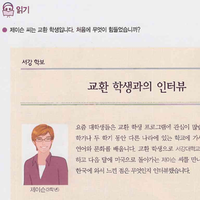제2과 학교생활-읽기
제2||학교 생활|
Lesson 2 School Life-Reading
Leçon 2 Vie scolaire - Lecture
第2課 学校生活-読書
Ders 2 Okul Yaşamı - Okuma
第 2 課 學校生活 - 閱讀
교환 학생과의 인터뷰
|Mit Austauschstudent|
exchange|with the|interview
Interview with exchange students
交換留学生のインタビュー
요즘 대학생들은 교환 학생 프로그램에 관심이 많습니다.
||Austausch||am Programm||
these days|college students|exchange|college student|in exchange student program|interest|are interested
These days, college students are very interested in exchange student programs.
最近の大学生は交換学生プログラムに関心が高いです。
교환 학생은 한 학기나 두 학기 동안 다른 나라에 있는 학교에 가서 공부하고 그 나라의 언어와 문화를 배웁니다.
|||ein Semester||Semester||||||||||||
exchange|exchange student||for a semester||semester|for|different|in another country|that is located|school|to go|study|that|country's|language|culture|learns
Exchange students go to schools in other countries for one or two semesters to study and learn the language and culture of that country.
交換留学生は、1学期または2学期の間、他の国の学校に行き、その国の言語や文化を学びます。
교환 학생으로 서강대학교에 와서 1년 동안 공부 하고 다음 달에 미국으로 돌아가는 제이슨 씨를 만나서 어떻게 준비했는지, 한국에 와서 느낀 점은 무엇인지 인터뷰했습니다.
||an der Sogang-Universität||||||||in die USA||Jason||||||||||interviewt haben
exchange|as an exchange student|Sogang University|||for a year|studying|and||next month|to the United States|returning|Jason|Mr. Jason|meeting|how|how prepared|to Korea|coming to|I felt|things I felt|what it is|interviewed
I met Jason, who came to Sogang University as an exchange student, studied for a year, and returned to the United States next month, and I interviewed him about how he prepared and how he felt after coming to Korea.
交換留学生として西江大学に来て1年間勉強し、来月アメリカに帰るジェイソンさんに会い、どのように準備したのか、韓国に来て感じたことは何なのかをインタビューしました。
제이슨 씨는 한국에 오기 전에 어떻게 준비하셨습니까?
||||||Wie vorbereitet?
Jason|||coming to|before||Did you prepare
How did Jason prepare before coming to Korea?
교환 학생으로 다른 나라에 가려면 학점이 3.0 이상이어야 돼요.
||||um zu gehen|||
exchange||||to go|grade point average|at least|is required
Um als Austauschschüler in ein anderes Land zu gehen, müssen Sie einen Notendurchschnitt von 3,0 oder höher haben.
To go to another country as an exchange student, you need to have a GPA of 3.0 or higher.
交換留学生として他の国に行くには、3.0以上の単位が必要です。
그래서 1학년 때부터 학교 공부를 열심히 했어요.
|grade|from that time|||diligently|
So I studied hard at school from the first year.
だから1年生から学校の勉強を頑張りました。
그리고 한국 문화나 전통에 대한 책도 많이 읽고 궁금한 것이 있으면 인터넷으로 찾아봤습니다.
||Kultur oder|zur Tradition|||||||||
||culture or|tradition|about Korean|books|a lot|I read|curious|things|if there is|on the internet|I looked up
I also read a lot of books about Korean culture and traditions, and if I had any questions, I looked them up on the Internet.
そして、韓国の文化や伝統に関する本もたくさん読み、気になることがあればインターネットで調べました。
한국어로 수업을 들으려면 한국어를 잘해야 하니까 한국어 공부도 열심히 했어요.
Korean|class|to take a class||I must be good at|because I have to||studying|diligently|I studied
In order to take classes in Korean, I have to be good at Korean, so I studied Korean hard.
韓国語で授業を受けるには韓国語が得意でなければならないので、韓国語の勉強も頑張りました。
한국 생활에서 뭐가 힘들었습니까?
|im Alltag||War es schwierig?
|daily life|what was|was difficult
What was the most difficult thing about living in Korea?
새로운 환경에 적응하려면 시간이 필요한 것 같아요.
|zur Umgebung|sich anpassen||||
new|environment|to adapt|time|necessary|thing, process|I think
||적응하기 위해서는||||
Ich glaube, ich brauche Zeit, um mich an die neue Umgebung zu gewöhnen.
I think it takes time to adapt to a new environment.
新しい環境に適応するには時間が必要だと思います。
처음에는 말도 안 통하고 음식도 입에 맞지 않아서 힘들었어요.
|||verstanden werden|||||
at first|communication||communicate|food|to my mouth|||it was hard
Am Anfang war es schwer, weil ich nicht sprechen konnte und das Essen nicht in meinen Mund passte.
At first, it was difficult because it didn't make sense and the food didn't suit my palate.
最初は言葉も通じないし、食べ物も口に合わず大変でした。
그런데 같은 하숙집에 사는 한국 학생들이 저를 많이 도와줘서 점점 익숙해졌어요.
||im Wohnheim||||||||
|the same|boarding house|living in|||||helping me|gradually|I got used
Aber die koreanischen Studenten im selben Wohnheim haben mir sehr geholfen, so dass ich mich daran gewöhnt habe.
However, Korean students living in the same boarding house helped me a lot, so I got used to it.
でも、同じ下宿に住んでいる韓国人学生がたくさん手伝ってくれたので、だんだん慣れてきました。
수업도 처음에는 언어 때문에 힘들었어요.
class||||was difficult
The class was difficult at first because of the language.
授業も最初は言葉の問題で大変でした。
그래도 수업을 열심히 듣고 숙제도 열심히 했어요.
||||Hausaufgaben auch||
still||||homework too|diligently|
Still, I studied hard and worked hard on my homework.
뭐든지 처음에는 힘들지만 열심히 하면 잘하게 된다고 생각해요.
anything||it's hard but||I work|do well|will become|I think
Everything is difficult at first, but I think that if you work hard, you will do well.
何事も最初は大変ですが、頑張れば上手くなると思います。
한국에서 생활한 후에 달라진 점은 무엇입니까?
|gelebt haben||||
|living in||changed|aspect, point|what
Was hat sich verändert, seit Sie in Korea leben?
What has changed since living in Korea?
韓国に住んでみて変わったことは何ですか?
마음이 넓어지고 생활에 자신감이 생겼어요.
|Weitet sich||Selbstvertrauen|
heart|widening|life|confidence|I gained
My mind has expanded and I have gained confidence in my life.
心が広くなり、生活に自信が持てるようになりました。
그래서 어떤 문제가 생겼을 때 이제는 다른 사람에게 부탁하지 않고 직접 해결해요.
|||||||||||löse es selbst
|any, some|problem arises|arose||now I||to others|ask for help|without asking|directly|I solve
||||||||부탁하지|||해결합니다
So, when a certain problem arises, now I solve it myself without asking anyone else.
だから、何か問題が起きたとき、今は他の人に頼まずに自分で解決しています。
물론 한국어도 많이 늘었어요.
|||hat sich verbessert
of course|Korean language|a lot|has increased
Of course, my Korean has also improved a lot.
もちろん、韓国語もたくさん増えました。
한국 친구들이 저한테 한국 사람이 다 됐대요.
|my Korean friends|to me|||all|they say I am
My Korean friends told me that I was all Korean.
韓国の友達が私に韓国人になったって言ってました。
한국에 오고 싶어하는 후배들에게 해 주고 싶은 말이 있습니까?
|||den jüngeren Kollegen|||||
|coming|want to|junior colleagues|to say|to give||words|do you have
Is there anything you would like to say to the juniors who want to come to Korea?
韓国に来たいと思っている後輩に伝えたいことはありますか?
한국에서 생활하는 것은 한국어하고 같이 생활하는 것이라고 생각해요.
|||||||Ich denke
|living||Korean language|together with|living|that|I think
Ich denke, in Korea zu leben bedeutet, mit der koreanischen Sprache zu leben.
I think living in Korea means living together with Korean.
韓国で生活することは、韓国人と一緒に生活することだと思います。
한국어를 알면 한국 생활에 빨리 적응할 수 있으니까 한국에 오기 전에 한국아를 열심히 공부하세요.
|||||||||||Koreanisch||
|you know||||adapt to||||||Korean language|diligently|study hard
If you know Korean, you can quickly adapt to life in Korea, so study Korean hard before coming to Korea.
韓国語がわかれば韓国生活に早く慣れることができるので、韓国に来る前に韓国語を一生懸命勉強してください。
그리고 한국에 와서는 한국의 문화를 많이 경험하는 것이 좋다고 생각해요
||nachdem ich angekommen bin|||||||
||coming to|Korean|culture||experiencing|||I think
And I think it's good to experience a lot of Korean culture when you come to Korea.
そして、韓国に来たら、韓国の文化をたくさん体験するのがいいと思います。

